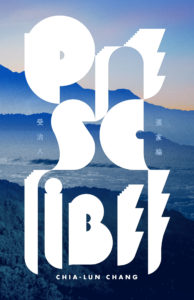 Review by DeMisty D. Bellinger
Review by DeMisty D. Bellinger
Chia-Lun Chang’s debut poetry collection, Prescribee, achieves parity of ornate language and critical thought throughout, shining a spotlight on unfair immigration policies and xenophobia, but still allowing herself to be playful at times and depart from the heavier subjects. From beginning to end, Chang adeptly addresses one’s own identity in an aggressively hostile environment, questioning womanhood and personhood in an adaptive country. It is clear why this intricate collection won the Nightboat Poetry Prize.
The first poem, “Parents,” works well as an introduction to the ensuing poems in that it acts as an origin story of the speaker and her family. Each thick, paragraph-like stanza shares intimate info of each parent, or personal interpretation of that parent’s experiences. In the beginning stanza, the speaker explains her father’s acquisition of language through “an electronic dictionary,” which transforms him: “The sexy robot offers, pronounces, creates another man, a respectable man, a free tour guide” (1). Later, the mother is noted as someone who learns to suppress herself to appeal to others, maybe even the father. From these two comes the speaker, part of a diaspora, who dreams of American children who have lost their roots.
A little later in the volume, the poem “The Government Makes Me” takes a metaphor of plants—of aloe, a succulent—for immigration and acceptance, along with assimilation. She compares different types of plants based on desirability and hardiness, and the flora mimicking in the poem stems from the government forcing the speaker to lie for a visa.
Chang smoothly plays with different styles of free form poetry in the collection, from couplets to prose. She is as comfortable moving lyrically across the page as she is discussing difficult topics, such as anti-immigration and the gatekeeping of language itself. In the poem “Engli-shhh Isn’t Yours,” over two and a half pages of mostly couplets, Chang makes English into a tangible thing: “English bangs the window” (14) and later, “I wear it the way girls are waterproof” (15). It becomes obvious rather quickly that Chang is a virtuoso with metaphor.
Lastly, as an example and to show that Chang moves beyond personal identity in her critiques, the poem “Simpatico,” examines late capitalism through exploitation of people and resources. The first line/stanza reads as an academic command, “To advance society,” then the poem continues with different directives, including “display a Christmas tree after removing nests of random birds,” and “wear a shirt after the young female worker sews saliva and/ mucous in.” Also notable, the rather dismal look at animal husbandry:
dip a spoon of honey after ordering a hive online, feeding bees
in spring, anesthetizing their tongues and poisoning them to
death in the winter.
You cannot help feel the weight of all of our responsibility for our actions in our world. Chang could not have found a better title than “Simpatico.”
Prescribee is smart and mellifluous, worthy of multiple reads and of sharing. And Chia-Lun Chang is a poet to keep an eye out for.
Prescribee by Chia-Lun Chang
Nightboat Books, 2022, $17.95 [paper, 88pgs],
9781643621517
DeMisty D. Bellinger is the author of the novel New to Liberty and of the poetry collection Peculiar Heritage. Her work can be found in various journals and anthologies, in print and online. DeMisty is a creative writing professor in central Massachusetts.
